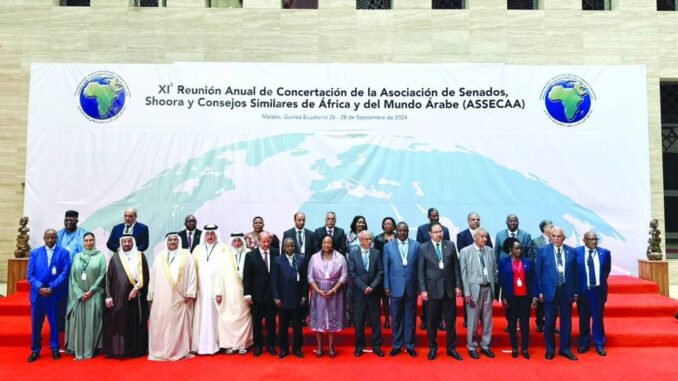
The challenges of combating desertification in Africa and the Arab World, and the innovative and sustainable solutions to deal with this phenomenon, were the focus of a panel discussion held on Friday in Malabo, Equatorial Guinean capital, as part of the 11th consultative meeting of the Association of Senates, Shuras and Equivalent Councils of Africa and the Arab World (ASSECAA), chaired by Morocco in the person of the Speaker of the House of Councillors, Enaam Mayara.
Participants in the panel, themed “Promoting logistical factors to combat desertification and land degradation,” stressed that desertification is the result of several factors, such as climate change and its impact on rainfall patterns, lack of water resources, deterioration in water quality, the inability of land to withstand farming, and unsustainable agriculture.
To face this phenomenon, the parliamentarians called for taking appropriate measures, implementing sustainable strategies for land management, and protecting natural resources, while focusing on raising awareness of the importance of preserving the environment and rationalizing the use of water resources, as well as developing sustainable agricultural practices and efficient irrigation techniques.
In this respect, the Moroccan delegation said that desertification, exacerbated by climate change, is having a harmful impact on biodiversity, and that Morocco, like other Maghreb countries, is located in a semi-arid context, which makes it a country with low rainfall, leading to persistent drought.
Aware of the risks of this phenomenon and its environmental and socio-economic impact, the Kingdom is committed to preserving its ecosystems, by ratifying multilateral environmental agreements and integrating them into socio-economic development policies and programs, the delegation said.
The Moroccan parliamentary delegation pointed out that this commitment is at the heart of Morocco’s new national sustainable development strategy, which focuses on “water and energy security and food sovereignty,” believing that efficient management of water, soil, and energy remains essential to guarantee access to these resources for future generations.
Protecting the Kingdom’s natural heritage, biodiversity and forests, as well as restoring ecosystems and fighting soil erosion are at the heart of the national policy to combat climate change, notably through the 2030 National Climate Plan, the delegation added, stressing that these issues are also taken into account when formulating forestry and agricultural development strategies, such as “Forests of Morocco 2020-2030” and “Generation Green.”
The ASSECAA 11th consultative meeting covered issues linked to strengthening coordination and consultation, exchanging visions and experiences, and improving joint parliamentary action by countries of the South, in particular Arab and African countries, to face environmental, technological and development challenges.
The two-day meeting focuses on three main themes: “Inter-regional initiatives and partnerships: opportunities for integration and development”, “Artificial intelligence in global south countries: challenges and opportunities” and “Strengthening and upgrading means of combating desertification and soil erosion”.
ASSECAA is a regional parliamentary organization working to promote bicameralism and strengthen economic, political, social and cultural cooperation between African and Arab regions, as well as to promote dialogue, coordination and exchange of expertise and experience between member countries.
